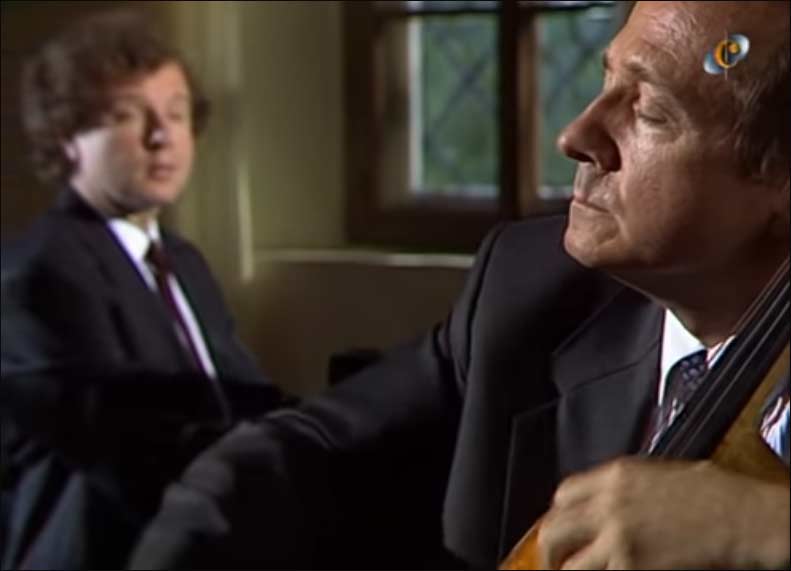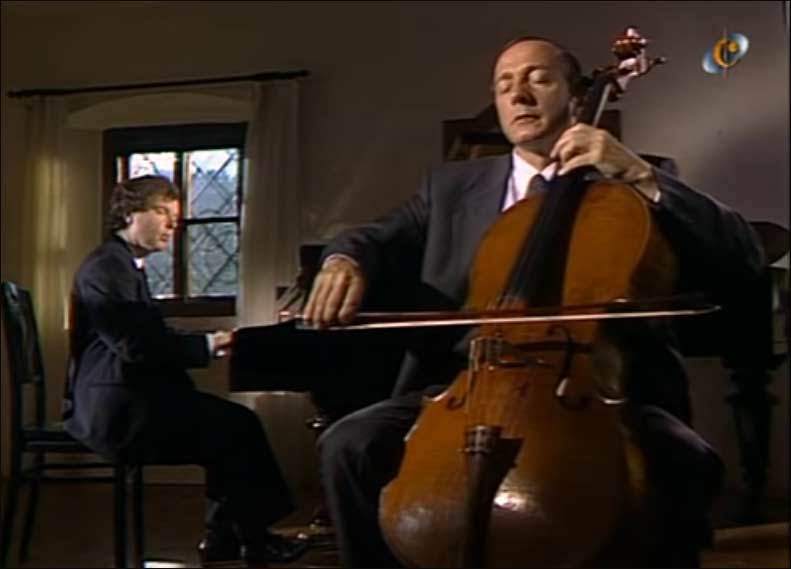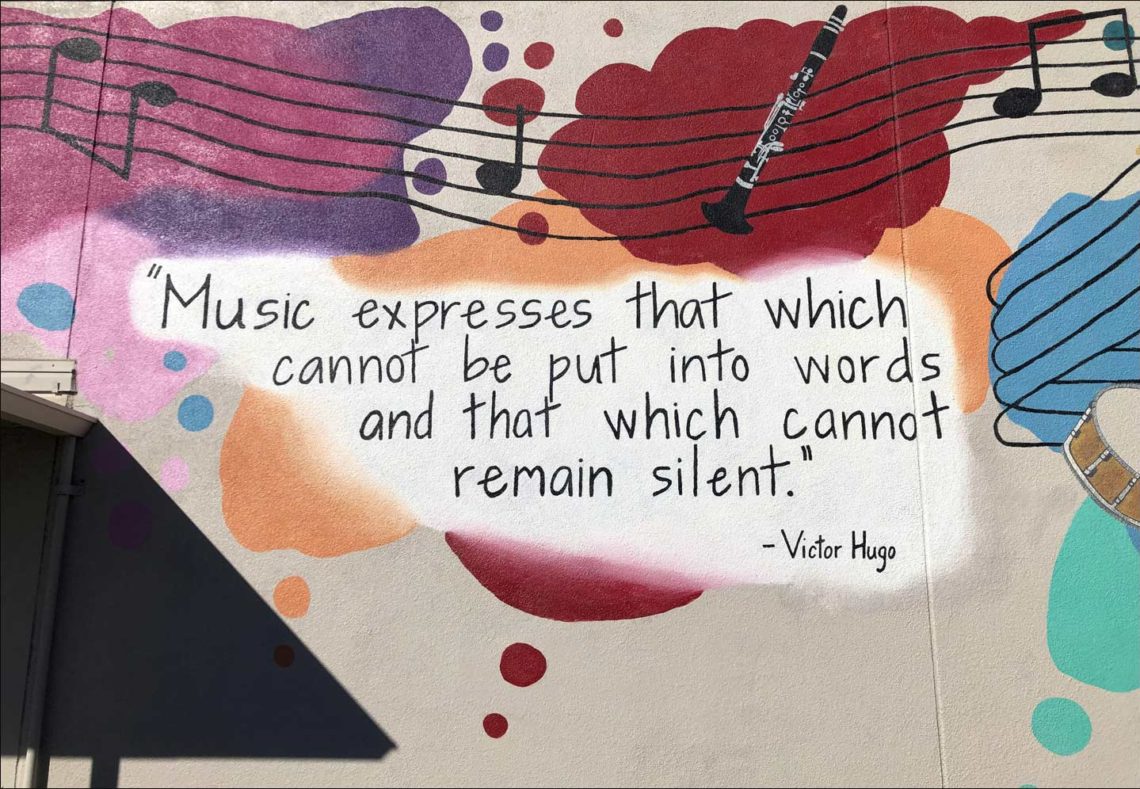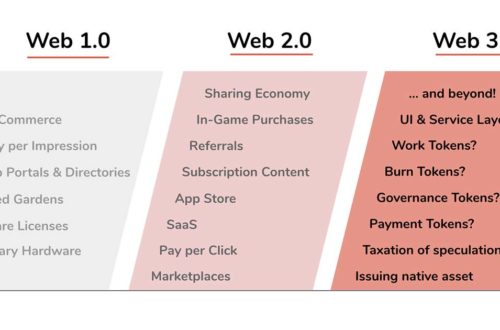Victor Hugo once said that “music expresses that which cannot be said and on which it is impossible to be silent.”
I am not sure about the “impossible to be silent” part, but music can convey emotions and messages which words, for all their versatile flexibility, cannot. The sound goes straight into our ears where it is translated by our brains into meaning. We interpret music into metaphors which we find to be important in our lives: love, death, sadness, happiness, etc.
Obviously, there is opera which uses many words to tell a story, for which music is an equal partner in the telling. The famous “Sull’aria” duet from Mozart’s “The Marriage of Figaro” or the final death scene from Verdi’s Aida are examples of this. And almost all recent popular music — from rock and roll to hip hop — is a combination of musical sounds set to words. Vocalists sing lyrics surrounded by accompanying sound.
But Beethoven’s symphonies (especially the 3rd, 5th, 7th, and 9th) are examples of music as pure metaphor. There are no words; it is pure sound. But we interpret sound, and emotions come into our minds and hearts. I cannot hear the middle movement of Beethoven’s Seventh Symphony without thinking it is the epitome of the tragic —
I don’t need a libretto to water this down. Give me the music straight without words. I will take the music pure in sound and unadulterated by literature. It will say what words cannot say, as Victor Hugo claimed.
But what does the music say? How exactly do we know? For example, how can we determine that the middle movement of Beethoven’s Seventh Symphony is melancholic? That Beethoven meant this to evoke sadness and tragedy? I do. Most seem to agree with me. But others might interpret it differently.
A while back I listened to a Daniel Berenboim video where he explained the celebrated pianists Edwin Fischer and Claudio Abbado saw completely different messages in Beethoven’s Piano Sonata No. 7. Both couldn’t be correct in their interpretations. Berenboim claims you have to be very careful in claiming to have the final word on what a piece of music is trying to say — using “adjectives” to explain music in words, rather than allowing the music to speak for itself in sound. It is a good point to remember.
I always thought this Slavonic Dance by Antonín Dvořák was among the saddest of sad music —
But could I be wrong? Do others hear it differently?
Or how about this piece Charlie’s Mood by Charlie Parker —
— a very specific kind of emotion fills me when I hear that. I always feel that Charlie Parker was in easy-going, positive mood when he penned that piece: it is 9:30 pm and the night is just getting started at some night-club in Kansas City where he is playing the blues with friends and fellow musicians, probably with a bit of heroin or alcohol on board. The chemicals have just taken effect and reality is pleasantly mellowed, so different from later that night when Parker’s self will be profoundly immolated by the habitual drug abuse which will eventually kill him. Early in the evening the world makes sense to Parker in music, as it makes no sense to him anywhere else. He is comfortable; he is at home. Charlie Parker was a masterful musician. He failed in just about everything else.
But is that just me? What are you supposed to feel? What was Parker’s point? What was he feeling? I must rely on tone and melody to translate the music into an intelligible message. But without words to help guide me maybe I misunderstand? I probably do.
How about Beethoven’s Kreutzer Sonata —
The feeling I get is tight angst and unbearable tension. How about you, dear reader? What emotion does this music conjure up for you? Why?
It is natural that all of us should come to associate bliss, dejection, hope, or with this piece of music or that. In fact, I would argue this is the basis of music as something which adds meaning to life and helps make it bearable.
Those who love music the most, they are the ones who construct the most emotional significance to any given piece of music.
“I cannot live without music!” the cliche goes. But that is an exaggeration. You can live without your cell phone or your favorite music. You can’t live without oxygen, in contrast.
But the emotional succor is obviously important to music lovers. Many devote the better parts of their lives to music. Almost all of us listen to and enjoy music to one extent or another.
Maybe music is like a Rorsacht test where the type of music you enjoy and why says as much about you as does the music itself. Are you an opera lover? Jazz? Pop music? Chamber music? Rhythm and blues? Folk music? Rap music? Sad stuff? Happy sounds? Music played loud and live as part of a community? (Coachella, SXSW, or some other giant multi-day music festival.) Or music listened to quietly at night by oneself? (The way I do it.) Jesus said there were “many mansions in my father’s house,” and the same could be said for the huge variety of music people consume for different reasons towards disparate ends. There are many devotees who argue that one form of music is superior to the others, but I prefer to be ecumenical and claim “each to his own.” All the various forms of music are in the end expressions of dissimilar sound serving similar ends.
The last couple of nights I have been in love with Franz Schubert’s Sonata in A minor for Arpeggione and Piano, D. 821. In particular, I love this performance of it by the Hungarians András Schiff and Miklós Perényi of —
Why do I love this piece of music? Why do I love this particular performance of it?
Let me explain.
In this performance András Schiff is the younger man, looking over at the older Perényi occasionally, who is himself so absorbed and consumed by the music that he notices nothing at all but it. They are in an unassuming small room, and the focus is on the musicians and the music; they are not playing in some ornate baroque church, or in aristocratic quarters at the palace of Versailles, as is often the case with classical music performances. The setting is unostentatious to allow the performers and the music to remain front and center. I find this effective.

Moreover, Schiff and Perényi today are hoary senior citizens, but they were not that way back when this performance was recorded. This performance says something about the cultivated gentility of central Europe in 1985, and that is a bygone age. Soviet-occupied Hungary might have meant communist oppression and shabby quarters, but there was still Franz Schubert and the richness of the central European cultural inheritance undiminished. The “dictatorship of the proletariat” — the Russians, and their Hungarian commuinst allies — couldn’t take that away.
The Soviet Union and its “Iron Curtain” are long gone, thankfully. Hungary has changed much since, and Schiff and Perényi are themselves so much older as to be almost different men themselves. In fact, Schiff long ago emigrated from Hungary to the United Kingdom and became a citizen there and expressed little desire ever to perform again in his native country. Hard communist dictatorship in Hungary seems to have morphed into soft right-wing autocracy: a similar wine in a different bottle, like Vladimir Putin in Russia. But that performance by Schiff and Perényi evokes a moment in history, and a moment in artistry between two gifted musicians, regardless of the politics yesterday or today.
The more I think about it, the more I see I probably am mostly wrong. My imagination run amok. Again, the music becomes a Rorschach test which says more about me than it. But that is me and how I view and interpret this performance.
Another person might see it differently. They might say this Austrian music played by Hungarians is white supremacy art symbolizing a Europe bent on colonial domination and racial superiority over the non-white parts of the globe. They might dislike it automatically due to politics or history.
But the music itself will outlast this ideology or that. The music abides. The music itself does not bear the trappings of political bias or human sin. The music is sufficient unto itself. The music is metaphor. The music — sounds put together, in the end — link us to the ultimate human touchstones felt in every life. The happiness, sadness, pity, love, hate, death, transcendence. The important stuff all of us need to process.
There are parts of Schubert’s Arpeggione which leave me a little cold, but the central leitmotif is gorgeous — “to die for” — and the part at 20:50 is so beautiful it makes me want to cry. In fact, I did cry while listening to it last night. So delicate. So exquisite.
Birds make their rudimentary music, and it seems as natural to them as breathing and flying. We humans do the same, or at least some of us do, but at a different level of complexity and abstraction — using both our voices and mechanical instruments, singly and in groups.
It is part of the glory of our species. Long live music!
Franz Schubert, thank you for your Arpeggione Sonata. I listened to it last night and it was as if I were right next to you in 1824 when you were composing it. The passage of almost two centuries meant nothing. You poured your heart and soul into this music, and it sounds the same now as it did then; we have your music written down, exactly as you penned it. When I listen to the piano and violoncello sing together, I travel through time and gain a glimpse into your mind at that time. You spoke in music, and I understood with no words spoken — sounds, only sounds. And so past and present are linked through art, and the future too is included when readers see these words henceforth. Ars longa, vita brevis!
And to András Schiff and Miklós Perényi: in watching this particular performance in a simple room years ago, I was able to share your knowledge and pleasure in performing this gorgeous piece of music. All that training and study. The ability to memorize an entire score and to play it so beautifully. I witnessed something rare and special in your performance. Did you feel it, too, András?
I keep on using words and language, my chosen medium, to explain sounds and music. When will I learn? Schiff and Perényi know better, not to mention Schubert. Music, just the music. Sounds, no words. How wonderful.
Thank you to all. My cup runneth over.
Is this not happiness?







